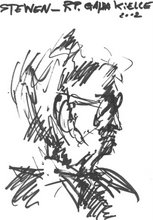
It was a damp and dull day and, arriving about 5:00 in the evening, we had little chance to see much beyond going to and round the town square.

There are some individual splendid buildings, such as the Town Hall.

This row of houses beside it were ornately decorated.

The buildings around the town square all have English language plaques explaining who built them. The main single group of builders seems to have been Armenian Merchants. I have seen reference to these in various places in Poland, but I know little about their position in old Poland or their influence on its development: a task for the future.
There was also a plaque on one building commemorating it as the birthplace of Rosa Luxembourg. Although I knew her name and that she was friends with fellow communist Józef Piłsudski, I hadn't realised that she was Polish.

I guess she is (understandably) out-of-fashion in today's anti-communist Poland, which is rather a pity as she is Poland's other most famous daughter for me - along with Marie Curie. Her political position seems particularly interesting within the context of the development of both communist (as it was) and socialist (as it is) thought. More English information is available here. I was told while I was there that she was Stalin's lover, but I suspect that that results from Polish anti-communist propaganda. Her birthplace is the house in the centre of the picture below.

The style of the house is much closer to what I consider to be the standard Polish old town design, with it's limited decoration. (Hence, my pleasure when walking around Lviv. It was also noticeable as soon as crossing the border into the Ukraine that even modern private houses are often built with a much more individual, non-rectangular design than is normal in Poland.)
If I lived in Zamość, I would already have produced a rather fuller history in English than is available on Wikipedia or elsewhere on the internet as far as could find. It may still be a future project, as it provides links into Polish history that are missing from my two local towns. I did, however, find this pdf document on the Jewish perspective of Zamość.
We had tried the internet to book a place to stay over-night,but the few places we found all seemed to be full. We therefore quickly booked in to a small hotel (hotelik) a little out of the centre on the Lublin road side. It is definitely not recommended unless you want to experience an 'ex-communist' hotel. Still we only wanted beds for a few hours (leaving at 5:00am), which were fine and it had warm water. I suspect that there would actually have been plenty of empty accommodation in or near the town square.

If you go back to the picture of the Town Hall, you'll see a small group of people around a blue umbrella. It was 1 July and the first day of the Polish EU Presidency. I've worked through loads of different Presidencies (including British) as a British civil servant dealing with EU issues and it hadn't mattered who had been in charge except in very minor, short term ways. If I hadn't been working on the EU, I probably never would have known about them. I have therefore been incredibly impressed by the way the Polish media has taken it up as a domestic promotional EU campaign.
I have also heard about attempts to use it to promote Poland abroad, which I hope is successful, but I must admit to being sceptical about it reaching much of an audience. Thenews.pl introduced me to the promotional video, although I can't find their page which described it as being metaphorical, related to such things as the economic collapse. Unfortunately this immediately led me to relate the dancers to Nero fiddling while Rome burnt. It also reminded me of the English business lobbyist on CNBC Europe's statement (paraphrased) that "People don't understand that politicians have virtually no influence on what really happens... and the worst decision they made was to join the EU". If you haven't seen the video yet ...
I don't know if we've still got Misia's Barbie animated films, but the animated characters look incredibly familiar and I think that's where the association comes from.


No comments:
Post a Comment